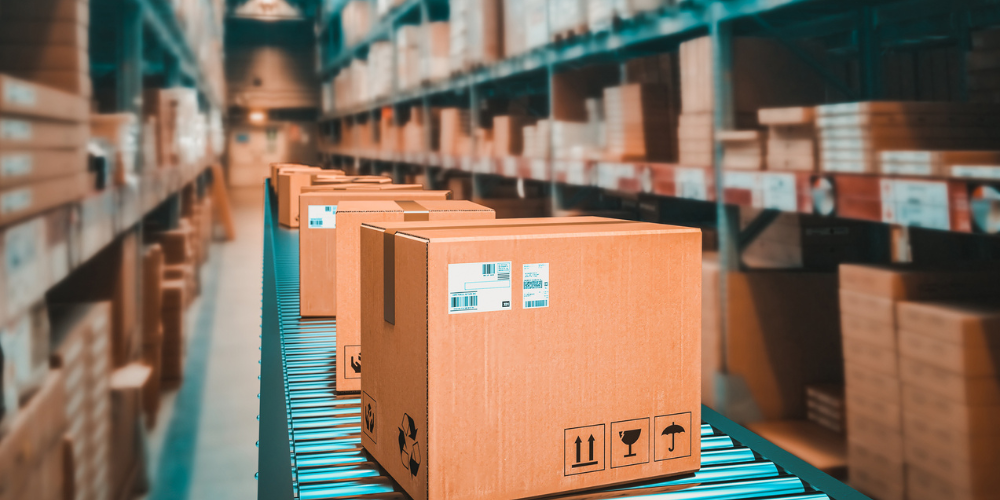Understanding Transportation Management in the Supply Chain
Transportation management stands as a linchpin, orchestrating the seamless movement of goods from point A to point B. It's more than just coordinating trucks and routes; it's about optimizing the entire logistics process to ensure timely delivery and cost efficiency. Transportation management involves planning, executing, and controlling the movement of goods, utilizing various modes of transportation such as trucks, ships, planes, and trains. It intersects with broader logistics operations by integrating with warehouse management, inventory control, and order fulfillment systems. This integration ensures that goods are delivered efficiently, minimizing delays and reducing costs throughout the supply chain.
Benefits of Implementing a Transportation Management System (TMS)
Embracing TMS is a strategic move towards unlocking a multitude of benefits for your supply chain. These benefits include:
- Cost savings through route optimization and freight consolidation.
- Enhanced visibility into shipment status and delivery timelines.
- Improved efficiency through automated processes and real-time tracking.
- Better decision-making with data-driven insights and analytics.
- Streamlined operations by integrating transportation with other supply chain functions.
Businesses are increasingly adopting TMS solutions to revolutionize their transportation strategies, enabling them to stay competitive in today's fast-paced market environment.
Choosing the Right TMS for Your Needs
With a myriad of TMS options available, selecting the right one can be a daunting task. What factors should you consider when evaluating TMS solutions? How can you ensure that your chosen system aligns seamlessly with your logistics requirements?
When evaluating TMS solutions, consider the following factors:
- Scalability to accommodate your growing business needs.
- Integration capabilities with existing systems and technologies.
- User-friendly interface for ease of use and adoption.
- Customization options to tailor the system to your specific requirements.
- Support and training provided by the TMS vendor.
By carefully considering these factors, you can ensure that your chosen TMS aligns seamlessly with your logistics requirements and delivers maximum value to your supply chain operations.
Optimizing Transportation Operations
In the realm of transportation management, finding the delicate balance between time and cost is paramount. How can businesses optimize their transportation operations to minimize costs without compromising on delivery timelines? What strategies can they employ to navigate this challenging terrain effectively?
Leveraging Analytics for Smarter Transportation Decision-Making
In today's data-driven landscape, analytics play a pivotal role in shaping transportation strategies. How can businesses harness the power of data analytics to make informed decisions about their transportation processes? What insights can be gleaned from analyzing transportation data, and how can they be leveraged to drive continuous improvement?
Enhancing Visibility Across the Supply Chain
Visibility is the cornerstone of effective supply chain management, and transportation plays a central role in ensuring transparency across the entire process. How can a TMS provide real-time visibility into shipment status and delivery timelines? What are the implications of enhanced visibility for supply chain efficiency and customer satisfaction?
Pros and Cons of Outsourcing Transportation Management
Outsourcing transportation management can indeed present businesses with a variety of advantages, yet it also entails certain drawbacks that must be carefully weighed. Here's a detailed look at the pros and cons:
Pros of Externalizing Transportation Management:
- Cost Savings: It can lead to significant cost savings by eliminating the need for in-house personnel, infrastructure, and technology investments.
- Access to Expertise: It allows businesses to tap into the expertise of professionals who possess specialized knowledge and experience in optimizing logistics operations.
- Scalability: It can scale up or down based on fluctuations in demand, providing businesses with greater flexibility and agility in managing their transportation needs.
- Focus on Core Competencies: Businesses can redirect their resources and attention towards core competencies and strategic initiatives, enhancing overall operational efficiency.
- Risk Mitigation: It can help mitigate risks associated with regulatory compliance, carrier management, and supply chain disruptions, as experienced third-party providers often have robust risk management processes in place.
- Speed to Value: it can help improve the time it takes to see value. Utilizing a third-party logistics company for transportation management can offer a faster implementation process than in-house efforts due to their established networks and expertise in logistics operations. These companies bring ready-to-use infrastructure and technology, significantly reducing the time needed to set up and optimize the supply chain.
Cons of Outsourcing Transportation Management:
- Loss of Control: Outsourcing transportation management means relinquishing control over certain aspects of logistics operations, which can lead to concerns regarding service quality, reliability, and responsiveness.
- Dependency on Third-Party Providers: Businesses may become overly reliant on external providers, making them vulnerable to disruptions, price hikes, and changes in service levels.
- Communication Challenges: Maintaining effective communication and collaboration with outsourced partners can pose challenges, particularly when dealing with multiple carriers or service providers.
- Confidentiality Risks: It may involve sharing sensitive business information with external partners, and raising concerns about data security, confidentiality, and intellectual property protection.
- Potential Hidden Costs: While it can yield cost savings, businesses must also consider potential hidden costs such as management fees, contract termination penalties, and additional charges for premium services or unforeseen contingencies.
The Role of Transportation Management in Delivering Goods to Customers
At the heart of transportation management lies the crucial task of delivering goods to customers efficiently and cost-effectively. Furthermore, it acts as a strategic enabler for businesses to differentiate themselves in the competitive marketplace. By implementing innovative delivery strategies, such as same-day or next-day delivery options, businesses can meet the growing demand for faster shipping while maintaining cost efficiency.
Additionally, transportation management plays a pivotal role in supporting omnichannel retail strategies by seamlessly integrating online and offline channels to provide customers with flexible delivery options, such as buy online, pick up in-store (BOPIS) or ship-from-store. Ultimately, effective management is not just about delivering goods—it's about delivering exceptional customer experiences that drive satisfaction, loyalty, and repeat business.
Investing in a Transportation Management System
While the initial investment in a TMS may seem daunting, the long-term benefits far outweigh the costs for many businesses. How can investing in a TMS yield significant returns in terms of cost savings, efficiency gains, and competitive advantage? What factors should businesses consider when evaluating the ROI of a TMS investment?
Future Trends
As technology continues to evolve, so too does the landscape of transportation management. From the rise of automation to the emergence of predictive analytics, what are the key trends shaping the future? How can businesses stay ahead of the curve and leverage these innovations to drive success in their supply chains?
Improve your Transportation Services Today
Ready to make your supply chain better and your deliveries faster? Let's talk about how our Managed Transportation Services can help your business. Reach out today for a chat with our team. We'll show you how easy it is to save money, improve efficiency, and keep your customers happy. Don't wait to improve your supply chain. Contact us now.
Frequently Asked Questions
Why You Should Invest in a TMS
These systems are crucial for businesses aiming to streamline their transportation supply chain and enhance efficiency. By using these systems, companies can gain visibility into their supply chain, make informed transportation decisions, and ultimately lower total costs while improving overall supply chain success. The benefits of a TMS extend beyond cost savings; it also facilitates efficient transportation planning and execution, providing real-time updates and track-and-trace capabilities that help manage potential delays and ensure timely delivery of goods.
How Long Does It Take to Implement a TMS?
Timelines vary based on the complexity of the system and the specific needs of the company. Generally, smaller businesses may be able to implement a TMS more quickly, typically within a few months, whereas larger enterprises with more intricate supply chains may require a longer implementation period, spanning several months to a year. It's essential to consider factors such as customization requirements, data integration, and training needs when estimating the implementation timeline for a TMS.
Who Needs a Transportation Management System?
Any company that relies on transportation as a critical component of its supply chain operations can benefit from using a TMS. Whether managing inbound or outbound logistics, companies across various industries, including retail, manufacturing, and distribution, can leverage a TMS to optimize transportation decisions, improve visibility into their supply chain, and lower transportation costs. From small businesses to large enterprises, implementing a TMS can provide more accurate planning and execution, enhance efficiency, and ultimately contribute to overall cost savings and supply chain success.
What are examples of transportation management systems?
Examples include cloud-based software solutions such as Oracle Transportation Management, SAP Transportation Management, and MercuryGate. These software systems allow companies to manage transportation operations, including route planning, carrier selection, freight billing, and track-and-trace functionalities. Additionally, third-party logistics providers (3PLs) often offer services as part of their offerings, providing companies with outsourced expertise to help manage their transportation needs effectively. By leveraging these systems and services, businesses can find the right solution to provide visibility into their supply chain, optimize transportation decisions, and achieve overall cost savings.
What is reverse logistics and what are its benefits?
Reverse logistics refers to the process of products being returned from a customer to a manufacturer or distributor. This process involves managing the flow of goods from the end-user back through the supply chain. The benefits of implementing a well-organized reverse logistics program are numerous. Firstly, it can lead to improved customer satisfaction as customers appreciate a smooth returns process. Additionally, it can result in reductions in warehousing and distribution costs, particularly when dealing with a significant percentage of returned shipments. By efficiently managing reverse logistics, businesses can address accounting issues related to returns, minimize damage to returned products, and control costs by selecting the most effective carriers for handling the reverse flow of goods. Therefore, integrating reverse logistics into the supply chain can enhance overall efficiency and customer service levels while reducing operational expenses.
What are the benefits of using ocean freight solutions?
Ocean freight solutions provide numerous benefits for businesses looking to transport their goods internationally. By utilizing ocean shipping, companies can take advantage of competitive rates that have been pre-negotiated with a network of reliable carriers.
Full Container Load (FCL) shipping is particularly advantageous for valuable cargo or larger shipments consisting of 12 or more pallets, ensuring that your goods are not combined with those of other shippers. On the other hand, Less than Container Load (LCL) shipping allows for sharing container space, making it a more cost-effective option for smaller loads being transported overseas.
Moreover, choosing ocean freight solutions streamlines the logistics process by offering comprehensive services such as air freight, customs brokerage, trade compliance, and surface transportation all under one roof. This integrated approach makes it convenient for businesses to manage all aspects of their global shipping needs efficiently and effectively.
What are the benefits of expedited and air freight services?
Expedited and air freight services offer a range of benefits that cater to the specific needs of businesses and individuals looking to transport goods quickly and efficiently. Some of the advantages include dedicated dispatch and freight management services provided by experienced associates, enhanced precautions and round-the-clock supervision for delicate shipments, the convenience of a single point of contact for all inquiries and requests, personalized options that allow for optimal service and value combinations tailored to individual requirements, as well as access to a wide variety of vehicle and trailer types, with the choice of single or team drivers for expedited and air freight deliveries.
How does LTL freight simplify the shipping process?
Less Than Truckload (LTL) shipments simplify the shipping process by offering a cost-effective solution for freight that does not require a full trailer and weighs between 150 and 15,000 pounds. Utilizing LTL freight allows for increased productivity and reduced freight spend through the sharing of trailer space with other shippers. By partnering with top LTL carriers, Visigistics passes competitive rates to its customers, further streamlining the process. Additionally, Visigistics's innovative Transportation Management System (TMS) enhances efficiency by providing real-time pricing, access to multiple carriers' capacities, and detailed reporting and analysis tools. Through the use of cloud-based TMS technology, shippers can seamlessly manage their freight shipments and make informed decisions from the moment they log on.
What are the benefits of intermodal freight solutions?
Intermodal freight solutions offer a range of benefits to businesses seeking efficient and cost-effective transportation options. These solutions provide the flexibility to accommodate any number of loads you have, ensuring that your shipping needs are met efficiently and economically. By leveraging online tracking capabilities, you can monitor your shipment's journey from its starting point to its destination, offering transparency and peace of mind. Moreover, intermodal solutions seamlessly adapt to your changing requirements, making transitions between modes of transportation smooth and effective. With contracted capacity spanning across the U.S., Canada, and Mexico, you have the assurance that your freight can be moved reliably across different regions.
What is integrated logistics?
Integrated logistics support is a strategic approach to business management that focuses on harmonizing resources and processes to operate as a unified entity. Unlike traditional logistics models where processes are siloed and disconnected, integrated logistics support seeks to eliminate these barriers and create a seamless flow of operations. By aligning various functions within an organization, integrated logistics aims to enhance efficiency, reduce friction, and overcome potential bottlenecks in the supply chain. Ultimately, the goal of integrated logistics is to optimize the coordination of activities, leading to improved customer satisfaction and a smoother movement of goods throughout the entire supply chain.
What role does technology procurement and deployment play in integrated logistics?
Technology procurement and deployment play a crucial role in integrated logistics by enabling businesses to streamline their operations and better serve their customers. By adopting the right solutions and processes, companies can effectively coordinate the transport of goods from the warehouse to the point of delivery, ensuring seamless handoffs and timely shipments. Integrated logistics also allows businesses to align their shipping and delivery processes with their unique business models, whether they follow a just-in-time manufacturing approach or manage complex inventories. Incorporating robust technologies, such as integrated transportation management systems (TMS) and warehouse management systems (WMS), is essential for breaking down data silos and providing a comprehensive view of operations, processes, and performance. Through the strategic procurement and deployment of technology, businesses can optimize their logistics workflows, enhance efficiency, and ultimately deliver exceptional service to their customers.
How does integrated logistics incorporate marketing into the workflow?
Integrated logistics incorporates marketing into the workflow by involving the marketing team in various aspects of the process. This includes collaborating with the logistics team to understand their customer-focused efforts, which can then be emphasized in marketing campaigns to set the company apart from competitors. Additionally, the marketing team plays a role in the design and implementation of branded packaging, contributing to an enhanced user experience. By integrating marketing into logistics, companies can effectively showcase their customer-centric approach and gain a competitive advantage in the market.
How does integrated logistics improve delivery processes?
Integrated logistics improves delivery processes by extending workflow efficiencies beyond the warehouse to the point of delivery. By employing the right solutions and processes, businesses can seamlessly manage the transportation of goods and ensure smooth transitions to customers. This approach allows businesses to align their shipping and delivery procedures with their individual business models, whether operating on a just-in-time manufacturing basis or managing intricate inventory systems. In doing so, integrated logistics streamlines operations and enhances the overall delivery experience for customers.
How does integrated logistics enhance fulfillment and dispatch operations?
Integrated logistics enhances fulfillment and dispatch operations by providing unparalleled visibility into the entire supply chain process. Through integration, organizations can gain detailed insights into various operations such as processing, picking, and packing, which helps in identifying inefficiencies and bottlenecks. This visibility enables businesses to make informed decisions for optimizing their supply chain activities, leading to improved efficiency and cost savings in the fulfillment and dispatch processes. Additionally, integrated logistics fosters better communication among all stakeholders involved in the process, facilitating smoother coordination and collaboration. By aligning all parties involved in the supply chain, organizations can create a streamlined and accelerated shipping and fulfillment process that meets the high expectations of modern consumers.
How does integrated logistics benefit production processes?
Integrated logistics benefits production processes by efficiently coordinating material handling, purchasing, inventory transportation, and supplier communication activities. This integrated approach acts as a conductor orchestrating various operations, preventing issues like under and over-ordering, thus ensuring stable and consistent cash flow for businesses. By streamlining these processes under a unified framework, operations become seamless, leading to increased customer satisfaction and faster movement of goods throughout the supply chain.
What does Visigistics's managed transportation program include?
Visigistics's managed transportation program includes collaborative support to ensure that your supply chain requirements align with your corporate guidelines. They evaluate your distribution system to design a cost-effective network and provide transportation guidance to enhance budget control and reduce response times.
How can Visigistics help streamline shipping processes through integrated logistics support?
Visigistics can help streamline shipping processes through integrated logistics support by breaking down barriers in logistics processes to ensure a smooth flow of data and enhance operational efficiency. As a logistics solution provider, Visigistics understands the challenges faced by companies in their supply chains and possesses the expertise to overcome them effectively. By leveraging their knowledge and resources, Visigistics can optimize shipping processes and improve overall efficiency in logistics operations. Interested parties are encouraged to reach out to Visigistics to learn more about how their services can enhance and streamline shipping processes through integrated logistics.





